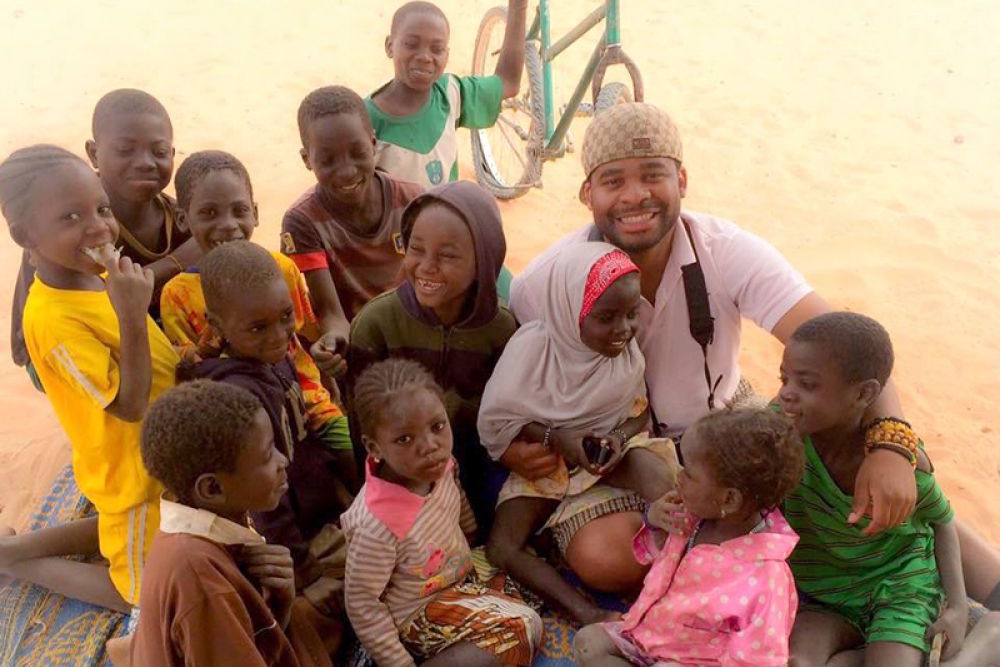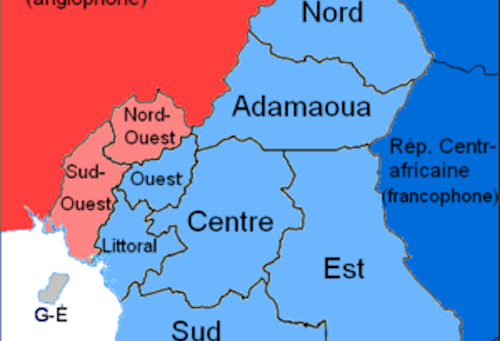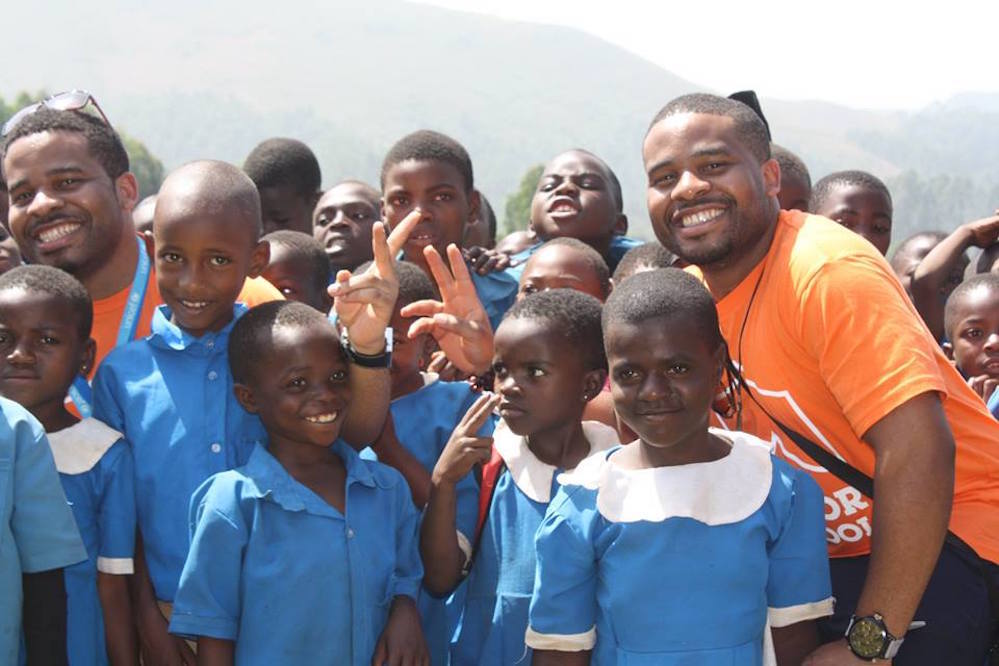“When we teach children from birth in their first language, it provides them the best chances of educational success”

Barriers to education, Discrimination of marginalised children, Right to education, Teachers and learning
To mark International Mother Language Day on February 21, Global Youth Ambassador Joannes Paulus Yimbesalu explains why teachers are on strike over French being imposed in Cameroon's English-speaking regions.
Whenever I introduce myself as a Cameroonian to my peers globally, one thing they always ask me about is our soccer team (which has just won the African Cup of Nations 2017).
However, recently, Cameroon has made international headlines for another reason – the ongoing social and political instability as a result of the strike action by teachers in the English region of the country.
Located in Central Africa, Cameroon has a population of over 24 million people, with French and English being its official languages.
It is often referred to as “Africa in miniature” because of its geological and cultural diversity which includes beaches, deserts, mountains, rainforests and savannas. The country is bordered by Nigeria to the west, Chad to the northeast, the Central African Republic to the east, and Equatorial Guinea, Gabon, and the Democratic Republic of Congo to the south.
Despite the generally high political and social stability Cameroon has enjoyed in the past decades, the recent strike action by teachers and lawyers came as a huge surprise to many – especially the government which has for so many hears given a “laissez faire” attitude to the plight of citizens living in Anglophone Cameroon.
Cameroon was originally colonised by the French and the English. I am originally from the English part of Cameroon, represented by the Northwest and Southwest regions with a population of about five million people. The remaining eight regions are all French-speaking.

Map of Cameroon showing the English-speaking Northwest and Southwest regions. The Extreme North region is missing from this map.
As child, I went to an English-speaking school and it was then I started to learn French as a second language. I still enjoy speaking French occasionally with my peers from the French-speaking parts of Cameroon.
However, since November 21, teachers and lawyers in the two English-speaking regions of Cameroon have been on strike because they think they have been under some form of marginalisation from the government by them imposing the French language on the schools and courts.
Since Cameroon gained its independence in 1961, Anglophones have often complained of the many forms of discrimination they face, especially with state jobs that always require knowledge of French and mostly hire people only from the French-speaking regions.
Most of the official documents in the country only get published in French despite the fact that the country is bilingual.
Most young English-speaking Cameroonians in universities in the French-speaking part of Cameroon often complaining that the lecturer only speaks French and gives out handouts or notes only in French.
They are forced to pay someone to translate these notes into English, which in most cases is time-consuming and also affects their academic performance because they have to work twice as much as their Francophone peers in school because of the language barrier. This has greatly stifled the language and cultures of Anglophones.
There has been a lot of debate as to why the learning levels of children in most countries are far below expectations. However, educational experts have argued that the way language is used in schools to deliver the curriculum could determine if children succeed in education.
Teaching in a language that is not a child’s first language - especially during preschool and or primary school years - is very demanding for the child. Joannes Paulus Yimbesalu, Theirworld Global Youth Ambassador
Whether or not a children is taught in their first language or mother tongue has a very direct link on them attending school or staying in school, especially in rural communities.
Teaching in a language that is not a child’s first language – especially during preschool and or primary school years – is often very demanding for the child, particularly when those communities face barriers to educations such as poverty, hunger and poor learning outcomes.
The failure of children to be competent in their second language is likely to delay economic growth.
When we teach children from birth in their first language, it provides them the best chances of educational success – otherwise it leads to poor performance and total exclusion from education.
Today 54 million out-of-school children live in countries that are considered “highly linguistically fractionalised” and these countries are accountable for over 58% of primary-school aged children.
In order to understand the current position in my country, I think it’s important to go down memory lane and see how Cameroon got its independence.
The Germans in 1884 colonised Cameroon and ruled it until 1916 when they were defeated during the First World War.

Students at HOPE For Children, Cameroon founded by Joannes
During that time, Cameroon was placed as a mandated territory of the League of Nations and given to France and Britain to rule. Cameroon was partitioned into two parts with three-quarters given to France and the remaining quarter to Britain until 1961 when she gained her independence.
January 1, 1960 saw French Cameroon gain its independence from France under President Amadou Ahidjo. Ten months later, former British Southern Cameroons, through a marriage with French Cameroon, officially became the Federal Republic of Cameroon.
However, since independence, English and French have been Cameroon’s official languages with over 260 tribes with distinct dialects. Cameroon has had just two presidents – Ahmadou Ahidjo who ruled until 1982 and was succeeded by current president Paul Biya.
Since independence, both English-speaking regions have been marginalised, as they are the minority.
Students from English-speaking Cameroon are increasingly worried that they may never get the jobs they need once they graduate from school.
They don’t often get the chance to be educated and work in their mother tongue – hence the reason why teachers in English-speaking Cameroon are asking the government to stop sending French teachers to schools who only speak French or pidgin to their students.
There is a similar situation with the country’s legal system, where English-speaking regions are forced to operate under French law. This has led to the closure of schools, radio stations which have been accused of inciting violence and – most recently – the shut down of the internet in both affected regions, which to many is a violation of their right to free speech.
Since the onset of the strike action, lives have been lost, people have been arrested and detained, and public property destroyed. The strike action has also forced many families in the affected regions to send their children to French-speaking schools so that they don’t miss out of the academic year.
Negotiations to end the strike have been deadlocked because of the arrest by government of some of its leaders. With many asking for complete independence and/or federation the government is not ready to welcome such an idea
As we celebrate International Mother Language Day every February 21 – with this year’s theme “Towards Sustainable Futures through Multilingual Education” – with the overall objective to promoting global citizenship education, it is very important that countries invest in learning opportunities that allow people to access to education in their mother tongue.
The mastery of one’s first language allows people to acquire the basic skills of reading, writing and numeracy in order to foster sustainable development.
More news

Take the test and discover how our Schools Hub helps students grasp the global education crisis
